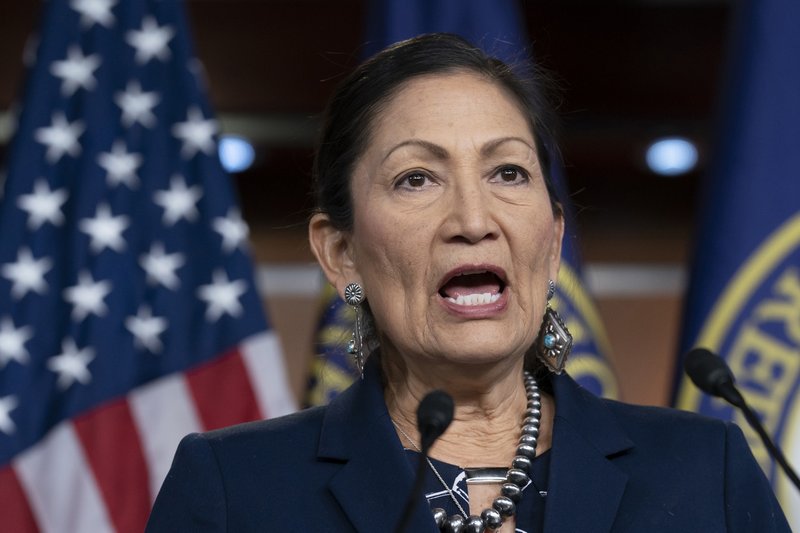National
AP sources: Biden to pick Rep. Haaland as interior secretary

President-elect Joe Biden plans to nominate New Mexico Rep. Deb Haaland as interior secretary, according to two people familiar with the decision, a historic pick that would make her the first Native American to lead the powerful federal agency that has wielded influence over the nation’s tribes for generations.
Tribal leaders and activists around the country, along with many Democratic figures, cheered Haaland’s selection after urging Biden for weeks to choose her. They stood behind her candidacy even when concerns that Democrats might risk their majority in the House if Haaland yielded her seat in Congress appeared to threaten her nomination.
With Haaland’s nomination, Indigenous people will for the first time in their lifetimes see a Native American at the table where the highest decisions are made — and so will everyone else, said OJ Semans, a Rosebud Sioux vote activist who was in Georgia on Thursday helping get out the Native vote for two Senate runoffs. “It’s made people aware that Indians still exist,” he said.
Haaland, 60, is a member of the Laguna Pueblo and, as she likes to say, a 35th-generation resident of New Mexico. The role as interior secretary would put her in charge of an agency that not only has tremendous sway over the nearly 600 federally recognized tribes but also over much of the nation’s vast public lands, waterways, wildlife, national parks and mineral wealth.
The pick breaks a 245-year record of non-Native officials, mostly male, serving as the top federal official over American Indian affairs. The federal government often worked to dispossess Native Americans of their land and, until recently, to assimilate them into white culture.
Her selection was confirmed by two people familiar with the decision who wasn’t authorized to speak about it publicly and spoke to the Associated Press on condition of anonymity on Thursday.
Navajo Nation President Jonathan Nez described himself as “overjoyed” and said in a statement, “It is truly a historic and unprecedented day for all Indigenous people.”
Gussie Lord, the head of tribal leadership at the environmental group Earthjustice and a member of the Oneida Nation of Wisconsin, watched Thursday as her email inbox filled with friends celebrating the news.
“Everyone was so excited,” Lord said. “To see the leadership of Native women reflected in our country’s leadership is so inspiring. I’m really proud of our country.”
“I am SO ELATED,” the head of progressive Democrats’ Sunrise Movement, Varshini Prakash, tweeted. “This will be the first time an Indigenous person – and a badass climate champion woman at that – will hold any presidential cabinet position. Congratulations to @JoeBiden for making history.″
Get-out-the-vote activists believe their efforts, and the Native vote, helped flip Arizona in particular for Biden and secure the presidency.
“There’s a feeling something is changing,” said Ashley Nicole McCray, a member of the Absentee Kiowa tribe of Oklahoma and of an indigenous environmental coalition. “Finally, we’ve come to this point where Indigenous sentiment is no longer being silenced.”
But Biden’s pick could further deplete, at least temporarily, the narrow majority Democrats maintain in the House. Biden has already selected several lawmakers from the chamber, including Louisiana Rep. Cedric Richmond and Ohio Rep. Marcia Fudge, to serve in his administration.
Some on Biden’s transition team had expressed concerns about dipping further into the already thinned Democratic House majority for another senior administration posting. But Biden decided that the barrier-breaking aspect of her nomination and her experience as vice chair of the House Committee on Natural Resources made her the right pick for the moment.
The president-elect has been methodically filling the posts in his Cabinet, adding North Carolina environmental official Michael Regan as his nominee to lead the Environmental Protection Agency, according to two people familiar with the selection process. Earlier this week, Biden introduced former South Bend, Indiana, mayor Pete Buttigieg as his transportation secretary, and he intends to make former Michigan Gov. Jennifer Granholm his energy secretary.
House Speaker Nancy Pelosi made it clear Wednesday that Biden had her blessing to choose Haaland, saying she would make an “excellent choice” as interior secretary. South Carolina Rep. James Clyburn, the No. 3 Democrat in the House and a close Biden ally, also supported Haaland for the job.
Haaland, one of the first two Native American women in the House, said she could see the difference her position made for ordinary Native Americans who came to her with business before the federal government.
“They felt comfortable just launching into the issues they wanted,” Haaland told the AP in an interview before her appointment. They would say, for example, “Oh, we don’t have to explain tribal sovereignty to you,” meaning tribes’ constitutionally guaranteed status as independent nations.
Haaland previously worked as head of New Mexico’s Democratic Party, as tribal administrator and as an administrator for an organization providing services for adults with developmental disabilities.
Born to a Marine veteran father and a Navy veteran mother, Haaland describes herself as a single mother who sometimes had to rely on food stamps. She says she is still paying off student loans after college and law school for herself and college for her daughter.
From her work, Biden saw a connection between “the personal and the policy” and believes Haaland’s experience will inform how she would approach the job, according to a person familiar with the Biden team’s deliberations who spoke on condition of anonymity to discuss internal matters.
New Mexico Sen. Tom Udall, who is retiring after 22 years in Congress and was initially considered the front-runner for interior secretary, congratulated Haaland on her selection, calling it “momentous and well-earned.”
Previously, the highest-ranking administration official known to have Native American heritage was Charles Curtis, who served as Herbert Hoover’s vice president and whose mother was one-quarter Kaw tribe.

